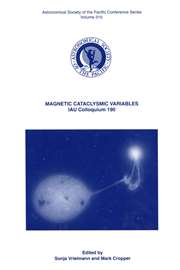Article contents
Binary Eclipsing Millisecond Pulsars: A Decade of Timing
Published online by Cambridge University Press: 12 April 2016
Abstract
We present results of long-term timing of eclipsing binaries PSR B1744–24A and PSR B1957+20 at Arecibo, the VLA, and Green Bank. Both pulsars exhibit irregularities in pulsar rotation and orbital motion. Increases and decreases of the orbital period of PSR B1957+20 are of order ΔPb/Pb ∼ 10−7, varying on a time scale of a few years. Over a decade of observations, the orbital period of PSR B1744–24A has only decreased, with time scale |Pb/Ṗb| ∼ 200Myr. When the effects of orbital motion are removed from the timing data, long-term trends remain in the pulse phase residuals, with amplitudes of order 30 and 500 μs, respectively, for B1957+20 and B1744–24A. Such large “timing noise” is not seen in other spun-up pulsars (isolated or binary), leading us to conclude that it is a consequence of mass flow in the system. Possible causes include variations in the rotation of the pulsars and movement of the binary systems along the line of sight (perhaps due to gravitational interactions with outflowing matter).
- Type
- Part 2. Timing, General Relativity and Astrometry
- Information
- International Astronomical Union Colloquium , Volume 177: Pulsar Astronomy - 2000 and Beyond , 2000 , pp. 67 - 72
- Copyright
- Copyright © Astronomical Society of the Pacific 2000
References
- 5
- Cited by


